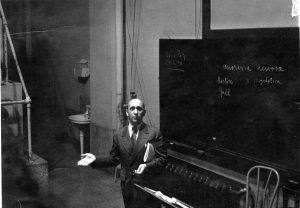Rita Teusch, PhD, is a Faculty Member of BPSI. Her remarks below originally appeared in the Fall 2019 issue of the Hanns Sachs Library Newsletter, which can be read here.

For many years, the Felix Deutsch collection at BPSI included Dr. Gerrit Hohendorf’s German-language dissertation on the evolution of Felix Deutsch’s psychosomatic theory. We discovered this paper, when Dr. Rita Teusch was writing A Biographical Sketch of Felix Deutsch, 1884-1964 (American Imago, 74(4), p. 519-524, Winter 2017). She recently summarized this interesting work for our English-speaking researchers.
Hohendorf, G. (1995). The Evolution of Felix Deutsch’s Psychosomatic Theory. Dissertation for his medical Doctorate at the Heidelberg Medical School, Ruprecht-Karls-University, Germany. 372 pp.
Felix Deutsch (1884-1964) is one of the most important pioneers in
psychosomatic medicine, even though little attention was paid to his work after his death. He was a Viennese internist with an excellent reputation in the early 1920s, and became interested in psychoanalysis without giving up his medical practice as an internist. He developed a special interest in treating organic illnesses with psychoanalysis, and educated physicians about psychoanalysis. His theoretical approach is based on conversion theory, and he extends this theory to include organic medical illnesses in which the affected organ has undergone psychopathological changes, such as asthma, angina pectoris, clogging of arteries. His concept of conversion also includes normal affective expressions such as weeping, perspiring, and high blood pressure; the quantity of these expressions of affect influences the conversion of mental processes into physical processes. Such a conversion begins very early on in a person’s development. In fact every bodily mechanism has a corresponding mental meaning, and Deutsch equates the physiological bipolar function of sympathicus/parasympathicus with the mental bipolarity of excitement and inhibition. He added to drive theory elements of object relations theory and ego psychology.
Hohendorf summarizes Deutsch’s psychosomatic theory in the following way: psychosomatic symptoms are the result of a patient’s specific way of resolving the interaction of his drive-related and interpersonal conflicts. Central in Deutsch’s thinking is the patient’s experience of early interpersonal loss. Through the development of psychosomatic symptoms, the patient attempts unconsciously to undo the original loss he experienced. According to Deutsch, undergoing psychoanalysis allows the patient to work through the loss so that it no longer needs to be symbolized in bodily changes. Deutsch develops a specific interview technique, called the associative anamesis, with which the interviewer directs the patient’s attention repeatedly to the interaction between his bodily symptoms and his relational, interpersonal conflicts. Deutsch’s theory of conversion is much broader than Franz Alexander’s. Unfortunately, in both Europe and the United States, Deutsch’s work has been mostly neglected. Hohendorf suggests that the full significance of Deutsch’s psychosomatic theory, which saw the baby’s earliest sense impressions as fundamental for subsequent physiological-mental development, is still to be discovered.
About the Author
Rita Teusch, PhD, is a Training and Supervising Analyst and faculty member of the Boston Psychoanalytic Society and Institute. She is a part-time Lecturer in Psychiatry (Psychology) at Harvard Medical School, Cambridge Health Alliance, and provides supervision to psychology interns and postdoctoral fellows at Cambridge Hospital. Dr. Teusch has a private practice in Harvard Square, Cambridge, MA
Rita Teusch can be contacted by email here.
***
The opinions or views expressed on the Boston Psychoanalytic Society & Institute (“BPSI”) social media platforms, including, but not limited to, blogs, Facebook posts and Twitter posts, represent the thoughts of individual contributors and are not necessarily those of the Boston Psychoanalytic Society & Institute or any of its directors, officers, employees, staff, board of directors, or members. All posts on BPSI social media platforms are for informational purposes only and should not be regarded as professional advice.
BPSI does not control or guarantee the accuracy, relevance, timeliness or completeness of information contained in its contributors’ posts and/or blog entries, or found by following any linked websites. BPSI will not be liable for any damages from the display or use of information posted on its website or social media platforms. BPSI cannot and does not authorize the use of copyrighted materials contained in linked websites.

